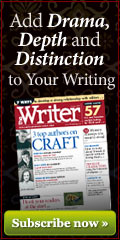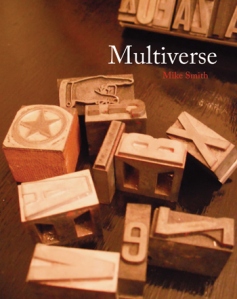Issue 4 - Winter 2011 Reviews Arranging the Blaze Beasts and Violins Crazy Jane Eating Fruit Out of Season Five Kingdoms Hard Rain Heathen Little Oceans Multiverse Open Slowly Psyche's Weathers Silent Music Something Must Happen The Apocalypse Tapestries The Darkened Temple The Kingdom of Possibilities The Tyranny of Milk This Pagan Heaven Woman on a Shaky Bridge You Know Who You Are Interviews
 |
In March of 2010, I heard Mike Smith read from his newest full length poetry collection, Multiverse. Before Mike read he gave a brief description of how the book was created and structured. When you hear what went into constructing the book you may think, as I do, that Mike Smith set a daunting poetic task in front of himself. In a “To the Reader” note that opens the book, Smith states, “The poems collected here are the products of an experiment into the possibilities of anagram as poetic form.” You read that right, Mike Smith created an entire book of poems based on anagrams. An anagram can be defined as “a word or phrase spelled by rearranging the letters of another word or phrase” (Wordnetweb). I didn’t realize there were other people trying to create anagram poems until I heard Mike Smith read but Mike and I are not the only people who have made this attempt. There is a whole Wikipedia article about Anagrammatic poetry. There isn’t much in the article but there are other websites where people have attempted this process to varying degrees of success. I had actually tried writing poetry anagrams after I watched a YouTube video by YA fiction writer John Green in which he discussed his love for anagrams. He presented quite a few with one of my favorites being that Joe Biden anagrams to “I Need a Job.” The anagrams I tried involved writing a first stanza in free verse. I would then try to create a second and/or third stanza using all the same letters that I had penned in the first stanza. It was difficult and none of the poems I wrote were ever published or are ones I even send out to magazines anymore. I just couldn’t quite make that strict of a form work for me. As I began Multiverse, I wondered how Smith could make this form work for him. Multiverse is separated into two sections. The first “Multiverse: A Bestiary” contains 24 poems which are not only anagrams of each other (they all contain the same letters) but are also modeled off the Medieval bestiary which were early, often illustrated encyclopedias of animals. My favorite poem in this first section is “Anemone, Limpet, Mussel, Crab” where Smith writes, “We mourn / the little clams that stud the sand / . . . delighted / by architects and entrepreneurs / whose slow beauty is a byproduct / of inner growth. “ This is a lovely poem even if you do not know it is of an anagram construct but realizing it is just makes those wonderful words even more awe inspiring. Smith, while using a very strict form, still found a way to come up with fresh phrasing. Of additional note on the poems in this section is that they also connect beyond the simple fact that they are a bestiary. These poems also speak to man’s relationship to animals with a sense of quiet environmentalism. The second section of Multiverse is “Anagrams of America.” These 17 poems are each anagrams of poems by other American poets. The poem that stood out for me in this section was “7 False Starts on Living in the Old Neighborhood” which is an anagram of Auden’s “The Unknown Citizen.” There is a social consciousness that speaks not only to Smith’s skill as a poet but to his ability to not just anagram but to respond to the work of a poet as powerful as Auden. The poem is in 7 sections and in the second Smith writes, “How you tell apart those who own from those who rent / on Roosevelt: One, they’re white, / with, Two, / fenced-in yards.” Smith is speaking to a different generation than Auden but Smith has the same social eye. Here are a few lines from the Auden’s poem that Smith anagrammed, “Our researchers into Public Opinion are content / That he held the proper opinions for the time of year; / When there was peace, he was for peace: when there was war, he went.” This is definitely a book I think poets should read, if for nothing else than to see how you can really stretch working with words down to the individual letter. I want to pick up some of Mike Smith’s other poetry to see what he does when he is less constrained because I did find there were a fair number of poems that just left me a bit, for lack of a better word, bored. They felt like they had been a chore to create and probably suffered a bit from being tied to what I would have to think is the hardest form ever self-imposed by a poet. That being said, again, this is definitely worth a read for the joy of reading as well as for technique. These are poems that will make you think about society, poetry, the poetic tradition as well as making you ask – Which one was the first one? Which of these poems launched an anagram obsession? Reviewed by Jessie Carty. |
